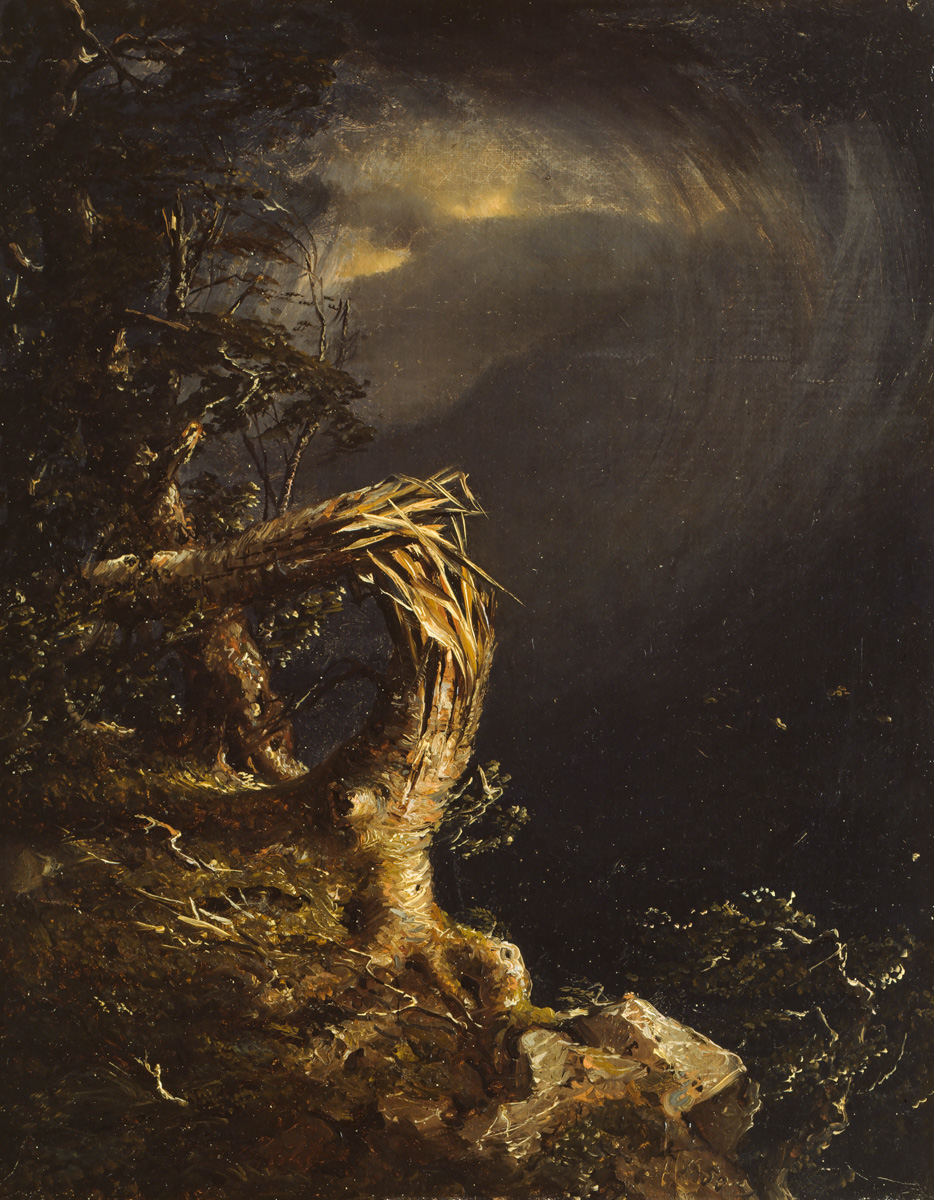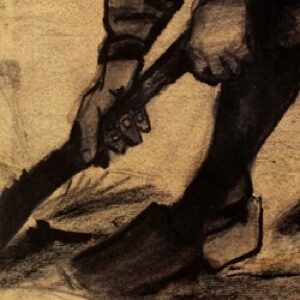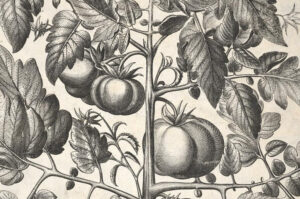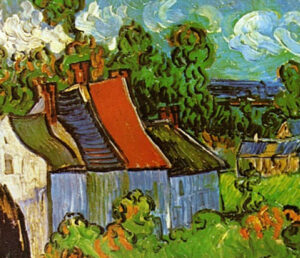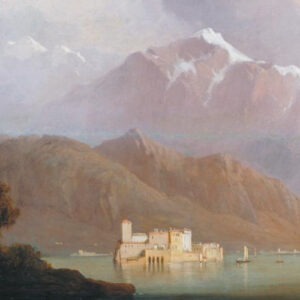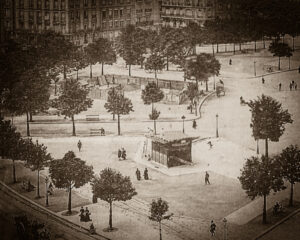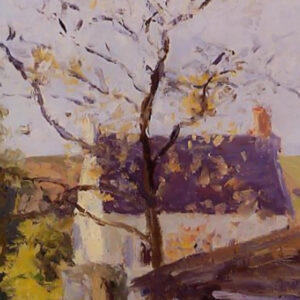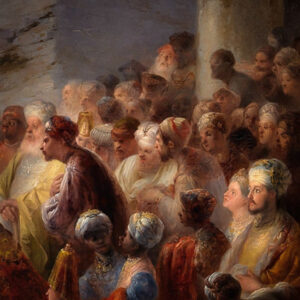After the Storm

Dr. Anthony Esolen
And Jesus did not say, but I can imagine that someone inspired by his words might have said, that there was a man with five silver oaks that the hurricane had blown down on his property, in four separate places barely missing the house and the power line, and he was out among them the next day, with a handsaw, trying to clear away some of the smaller limbs, though the trunks of the trees were three feet thick, and each of the trees weighed four thousand pounds.
And a man came by in his truck, a perfect stranger, who said, “Hello there, you’re going to give yourself a heart attack with that handsaw! Let me at ’em with my chainsaw.” For the stranger said that God had sent him. This was as a penance for his sins, he said, because he had gone by the property some months ago, and he peeked in the windows to see what was going on.
For the property was once the glebe house for the pastor of the parish church across the road. “My grandfather built that church in 1954,” said the stranger. It is a church no longer, though. The Canadian Catholic diocese — Antigonish, in Nova Scotia — had closed it and two of the other churches on our island, leaving two of five, for the time being. The steeple still stands, though the new owners will probably have it down. They are turning the building into apartments.
We are restoring that house, so I took him inside and showed him what we have been doing, especially the handsome three-color Victorian painting and stenciling in the various rooms, each one with a plan of its own, but all coordinated together for the eye to take in. He approved most heartily, especially of the antique furniture and fixtures — an old “Coolerator” range that does in fact work — and his approval meant a lot because he’s a mason and carpenter by trade. That in fact is why he was in the neighborhood in the first place. He’s the one doing the interior work for the one-time church his grandfather built.
Thirty years ago, he said, God cleaned him up, “no drugs, no booze,” and ever since then, he tries to follow what God tells him to do. He is a long-haired friend of Jesus, on the far side of sixty, as I am too, though I need a haircut and he doesn’t because his long hair suits him well. But his generosity suited him better. At first I said, “I can pay you,” and he cried, “No, no talk about that!” And his language as he refused had just a dash of salt in it, which was fine.
At first I said, “I can pay you,” and he cried, “No, no talk about that!” And his language as he refused had just a dash of salt in it, which was fine.
It was a wonder to see him scrambling diagonally up along one of the fallen trees, with the chainsaw chugging, as he held onto a limb with one hand and lopped off this or that small limb on the way, always an oak limb and never his own, till he got twelve feet off the ground and started to carve up the big stuff, chunk by chunk. “They’d charge you a thousand or two thousand to clear this away,” he said, referring to the general “they” who take advantage of Americans, though, considering the bulk of the job and how close one of the downed limbs got to the hot power line, I’d have paid that two thousand and thought myself fortunate to get away with no worse. Sometimes I’d half swear he was going to shear the limb he was standing on, but no, he knew what he was doing. We didn’t finish, but he said he’d come by the next day and wrap it up, and he’d even cut down a still-standing silver oak to boot, a too-tall and too-sickly thing, the only one left that threatens the power line.
(It is several rainy days later. He’s done what he promised, and more: stacked the limbs and chunks in neat piles, and cleared the driveway altogether.)
 When I asked him if he was in the phone book, so I could find his house and give him something, he laughed and refused, but he said that I’d surely see him here or there because he’s always about. He knows, too, where we live — I made sure of that. But on our island, everybody knows everybody.
When I asked him if he was in the phone book, so I could find his house and give him something, he laughed and refused, but he said that I’d surely see him here or there because he’s always about. He knows, too, where we live — I made sure of that. But on our island, everybody knows everybody.
Well may you wonder that a man of more than sixty years should be doing such work. The answer is almost that only a man that old would do it or could do it. There are three reasons why. The first is that our island, like the whole of Cape Breton to which it belongs geographically, has been bleeding population, mainly the young. Cape Breton’s economy used to depend on coal mining and fishing. The coal is no longer mined, and Ottawa has placed severe limits on the fishermen, with predictable results. You can buy a first-class lobster license from someone who has one, or so I’ve been told, for three or four hundred thousand dollars. And cod fishing, once the basis for everything on our island, has been under the ban since the early 1990s, when the cod and haddock populations crashed.
Still, there are young people — we do, after all, have schools. But it’s the same story here as in the States. The young people don’t have the skills to do what my Good Samaritan did. They never learned them in school, which manages to impart fads and fetishes aplenty, but no knowledge of arts and letters, and no skills for the hands. The boys did not learn the know-how from their fathers, often because they did not know their fathers. For the Lonely Revolution has hit here just as in the States. Then too, the kids here are at their screens all the time, whereby they are screened indeed – turned into flashing mirrors of the madness they see, and screened from God’s world of wind and storm and sea, silver oaks, hemlock and fir to hew and plane, creatures to hunt and fish for, and the maddest and most wondrous of all living things, other people, male and female, foolish and wise, sinning and suffering, living and rejoicing.
And then there is the Church I belong to, closing one parish after another, because the worship of God is a skill too, if we think of it from the human side; it requires a touch, a knowledge in the bones. I needn’t comment here on the sad state of sacred music and liturgy in Canada as in the States, and how the manner of many pastors and parishioners has slipped into a kind of pleasant slovenliness. But it appears to me that when all is against you, you do the “unreasonable” thing. You attack. With good cheer, to be sure, but you attack.
But it appears to me that when all is against you, you do the “unreasonable” thing. You attack. With good cheer, to be sure, but you attack.
If a sixty-one-year-old man can take his life in his hands and scramble aloft with a chainsaw to help a perfect stranger, then we, clergy and laymen both, can and should do what amounts to a lot less, to help ourselves and our churches that lie beaten and bleeding at the roadside.  People don’t pray anymore? Pray in their presence, and not with that solemn look that makes you seem as if you thought God were somewhere beneath your sternum. Pray with a kind of matter-of-fact pleasure, with the solemnity of quiet delight. People feel uncomfortable sidling through the church doors? I’d feel that way too, if I thought that somebody would be there to welcome me with a patronizing smile. Then bring the worship out among them, where they can pretend that they have just happened by. Have people forgotten how to pray morning and evening prayers? Teach them. Is Christ not honored? Tell them what he says, and let his words speak for themselves. Sure, it’s the alphabet of devotion, but you have to begin somewhere.
People don’t pray anymore? Pray in their presence, and not with that solemn look that makes you seem as if you thought God were somewhere beneath your sternum. Pray with a kind of matter-of-fact pleasure, with the solemnity of quiet delight. People feel uncomfortable sidling through the church doors? I’d feel that way too, if I thought that somebody would be there to welcome me with a patronizing smile. Then bring the worship out among them, where they can pretend that they have just happened by. Have people forgotten how to pray morning and evening prayers? Teach them. Is Christ not honored? Tell them what he says, and let his words speak for themselves. Sure, it’s the alphabet of devotion, but you have to begin somewhere.
And what of the other problems I have mentioned, the fatherlessness, the loss of cultural memory, the disillusionment of the young, the failure to impart the skills of life? Do we really think that these admit of political solutions? That is like attempting to sell love at the supermarket, or to demand it at the edge of a knife. If man is made in the image of God — and I’m asking a question of fact, there — then it stands to reason that he cannot have a cultural revival without a profound religious awakening. History knows no counterexample.
Well then, no longer stare at the fallen trees, shaking your head and shrugging. Begin.

